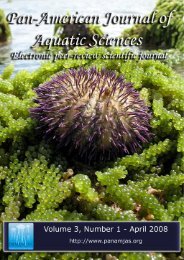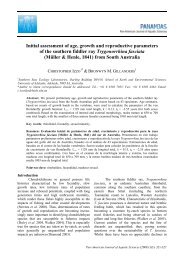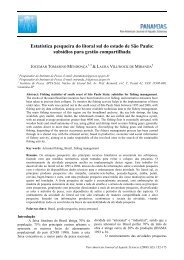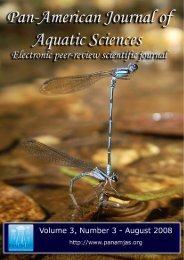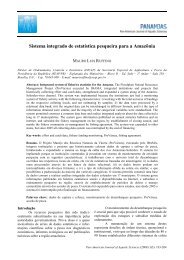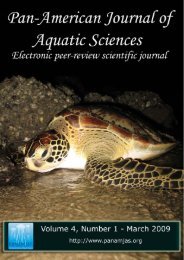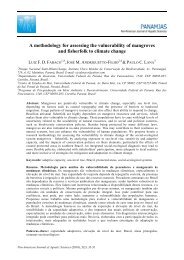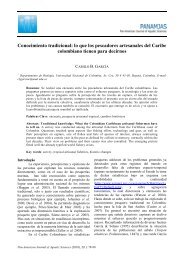Download full issue - PanamJAS
Download full issue - PanamJAS
Download full issue - PanamJAS
- No tags were found...
Create successful ePaper yourself
Turn your PDF publications into a flip-book with our unique Google optimized e-Paper software.
An essay on the potential effects of climate changeon fisheries in Patos Lagoon, BrazilFÁBIO DE ANDRADE SCHROEDER 1 & JORGE PABLO CASTELLO 21 Institute of Oceanography, University of Rio Grande, Av Itália Km 8, RS, Brazil. CEP 96201-900. Email 1 :tazzoceano@yahoo.com.br; Email 2 : docjpc@furg.brAbstract. Important artisanal fisheries depend on the Patos Lagoon estuarine resources (southernBrazil). About 3,500 fishermen work in this region. Some resources, notably pink shrimp, whitemouthcroaker and grey-mullet are estuarine-dependent species as their life cycles depend on abrackish water environment. The ENSO cycle and climate changes may impact the estuary. In thisessay, we sought to qualitatively analyze these environmental changes impact on estuarinesecondary production and fisheries. We ponder the currently available knowledge about thespecies and regional climate models which show a maximum 2ºC increase in the next 30 years,with rainfall rates showing little change. However, the lagoon outflow should increase due tochanges on the hydrographic basin, which would increase the limnic and decrease the salineinfluence in the estuary. This scenario may impact the biology and dynamics of estuarinedependentspecies and their fisheries, because temperature influences metabolism, which affectsthe growth of individuals. Larvae natural mortality may increase due to metabolic stress, althoughincreased growth rates may also reduce the vulnerability period of young to predation. A decreasein the species maximum size is also expected, as well as a shift in biomass peaks and changes inthe fishing calendar.Keywords: temperature and rainfall increase, estuarine fishery resources, climate impactsResumo. Um ensaio sobre os efeitos potenciais das alterações climáticas sobre a pesca naLagoa dos Patos, Brasil. Importantes pescarias artesanais dependem dos recursos estuarinos daLagoa dos Patos (sul do Brasil). Estima-se que 3.500 pescadores trabalhem na região. Algunsrecursos (camarão-rosa, corvina, tainha) são estuarino-dependentes, tendo seus ciclos de vidaligados ao ambiente salobro. Este ensaio analisa qualitativamente os impactos que as mudançasclimáticas terão sobre a produção secundária e a pesca estuarina. Considerou-se os conhecimentosdisponíveis sobre a biologia e dinâmica das espécies envolvidas e os modelos climáticos. Estesapontam um aumento máximo de 2ºC na região nos próximos 30 anos, com pouca mudança naprecipitação. Entretanto, a vazão da lagoa deve aumentar, devido às mudanças antrópicas na baciada Lagoa dos Patos, aumentando a influência límnica e reduzindo a influência salina no estuário.Nesse cenário, esperam-se impactos na biologia, dinâmica e pesca das espécies estuarinodependentes,pois a temperatura influencia o metabolismo, afetando o crescimento individual. Amortalidade natural larval aumentaria, devido ao estresse metabólico, mas o aumento das taxas decrescimento reduziria o período de vulnerabilidade juvenil à predação, diminuindo a mortalidadenatural. É esperada uma diminuição no tamanho máximo das espécies, assim como umdeslocamento dos picos de biomassa e mudanças no calendário de pesca.Palavras-chave: aumento de temperatura e chuva, recursos pesqueiros estuarinos, impactosclimáticosIntroductionUntil the Industrial Revolution (earlynineteenth century), anthropogenic actions (e.g.,deforestation, the regional extinction of species,destruction of the natural landscape) had onlyregional or perhaps even continental impacts. Afterthe Industrial Revolution, however, the impacts ofhuman activities became global (based on thepremise that climate changes are the result ofPan-American Journal of Aquatic Sciences (2010), 5(2): 320-330



